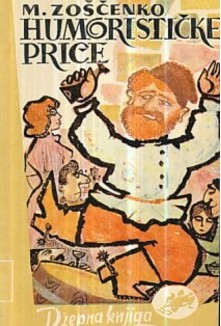
Mihail Mihajlovič Zoščenko (1894–1958) bio je ruski pisac poznat po svojim humorističkim i satiričkim pričama. Zoščenko je bio jedan od najpopularnijih sovjetskih pisaca u periodu između dva svetska rata. Njegove priče istražuju svakodnevni život u Sovjetskom Savezu, prikazujući apsurde birokratskog sistema, društvene nejednakosti i svakodnevne poteškoće s kojima se obični ljudi suočavaju. Zoščenko je koristio jednostavan, ali efektivan jezik kako bi ispričao svoje priče, često se služeći ironičnim tonom. Njegovi likovi su obično "mali ljudi", obični građani koji se snalaze u teškim društvenim i ekonomskim okolnostima. Kroz humor i satiru, uspevao je da kritikuje društvo, ali i da zabavi svoje čitatelje. Iako je Zoščenko bio izuzetno popularan, njegovo pisanje nije uvek bilo dobrodošlo od strane sovjetskih vlasti, koje su ga kritikovale zbog pesimističkog prikazivanja sovjetske stvarnosti. Kasnije u životu, Zoščenko je cenzurisanj, pianje mu je zabranjivano, ali je ipak ostao jedan od ključnih figura ruske književnosti 20. veka.
Authors

Mikhail Zoshchenko (Russian: Михаил Зощенко) was born in Poltava, Ukraine, on 29th July, 1895. He studied law at the University of Petersburg, but did not graduate. During the First World War Zoshchenko served in the Russian Army. A supporter of the October Revolution, Zoshchenko joined the Red Army and fought against the Whites in the Civil War. In 1922 Zoshchenko joined the literary group, the Serapion Brothers. Inspired by the work of Yevgeni Zamyatin, the group took their name from the story by Ernst T. Hoffmann, the Serapion Brothers, about an individualist who vows to devote himself to a free, imaginative and non-conformist art. Other members included Nickolai Tikhonov, Mikhail Slonimski, Victor Shklovsky, Vsevolod Ivanov and Konstantin Fedin. Russia's most important writer of the period, Maxim Gorky, also sympathized with the group's views. Zoshchenko's early stories dealt with his experiences in the First World War and the Russian Civil War. He gradually developed a new style that relied heavily on humour. This was reflected in his stories that appeared in Tales (1923), Esteemed Citizens (1926), What the Nightingale Sang (1927) and Nervous People (1927). Zoshchenko satires were popular with the Russian people and he was one of the country's most widely read writers in the 1920s. Although Zoshchenko never directly attacked the Soviet system, he was not afraid to highlight the problems of bureaucracy, corruption, poor housing and food shortages. In the 1930s Zoshchenko came under increasing pressure to conform to the idea of socialist realism. As a satirist, Zoshchenko found this difficult, and attempts such as the Story of one Life were not successful. Zoshchenko increasing got into trouble with the Soviet authorities. His autobiographical, Before Sunrise, was banned in 1943 and three years later his literary career was brought to an end when he was expelled from the Soviet Writers' Union after the publication of The Adventures of a Monkey in the literary magazine, Zvezda. Mikhail Zoshchenko died in Leningrad on 22nd July, 1958. (source: spartacus.schoolnet.co.uk)